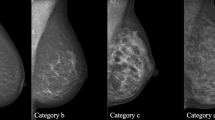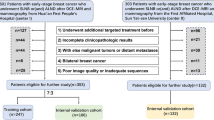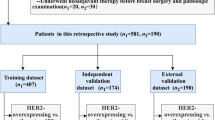Abstract
Purpose
To investigate the value of the combined diagnosis of multiparametric MRI-based deep learning models to differentiate triple-negative breast cancer (TNBC) from fibroadenoma magnetic resonance Breast Imaging-Reporting and Data System category 4 (BI-RADS 4) lesions and to evaluate whether the combined diagnosis of these models could improve the diagnostic performance of radiologists.
Methods
A total of 319 female patients with 319 pathologically confirmed BI-RADS 4 lesions were randomly divided into training, validation, and testing sets in this retrospective study. The three models were established based on contrast-enhanced T1-weighted imaging, diffusion-weighted imaging, and T2-weighted imaging using the training and validation sets. The artificial intelligence (AI) combination score was calculated according to the results of three models. The diagnostic performances of four radiologists with and without AI assistance were compared with the AI combination score on the testing set. The area under the curve (AUC), sensitivity, specificity, accuracy, and weighted kappa value were calculated to assess the performance.
Results
The AI combination score yielded an excellent performance (AUC = 0.944) on the testing set. With AI assistance, the AUC for the diagnosis of junior radiologist 1 (JR1) increased from 0.833 to 0.885, and that for JR2 increased from 0.823 to 0.876. The AUCs of senior radiologist 1 (SR1) and SR2 slightly increased from 0.901 and 0.950 to 0.925 and 0.975 after AI assistance, respectively.
Conclusion
Combined diagnosis of multiparametric MRI-based deep learning models to differentiate TNBC from fibroadenoma magnetic resonance BI-RADS 4 lesions can achieve comparable performance to that of SRs and improve the diagnostic performance of JRs.





Similar content being viewed by others
Data availability
Data are available in the article. All other data can be provided upon reasonable request to the corresponding authors.
Code availability
The code of the proposed method can be provided upon reasonable request to the corresponding authors.
References
Anders C, Carey LA (2008) Understanding and treating triple-negative breast cancer. Oncology (Williston Park) 22:1233–1239 (discussion 1239–1240, 1243)
Byra M, Galperin M, Ojeda-Fournier H, Olson L, O’Boyle M, Comstock C, Andre M (2019) Breast mass classification in sonography with transfer learning using a deep convolutional neural network and color conversion. Med Phys 46:746–755. https://doi.org/10.1002/mp.13361
Choi JH, Kang BJ, Baek JE, Lee HS, Kim SH (2018) Application of computer-aided diagnosis in breast ultrasound interpretation: improvements in diagnostic performance according to reader experience. Ultrasonography 37:217–225. https://doi.org/10.14366/usg.17046
Clauser P, Krug B, Bickel H, Dietzel M, Pinker K, Neuhaus VF, Marino MA, Moschetta M, Troiano N, Helbich TH, Baltzer PAT (2021) Diffusion-weighted imaging allows for downgrading MR BI-RADS 4 lesions in contrast-enhanced MRI of the breast to avoid unnecessary biopsy. Clin Cancer Res 27:1941–1948. https://doi.org/10.1158/1078-0432.CCR-20-3037
Costantini M, Belli P, Bufi E, Asunis AM, Ferra E, Bitti GT (2016) Association between sonographic appearances of breast cancers and their histopathologic features and biomarkers. J Clin Ultrasound 44:26–33. https://doi.org/10.1002/jcu.22312
DeLong ER, DeLong DM, Clarke-Pearson DL (1988) Comparing the areas under two or more correlated receiver operating characteristic curves: a nonparametric approach. Biometrics 44:837–845
Dogan BE, Turnbull LW (2012) Imaging of triple-negative breast cancer. Ann Oncol 23(Suppl 6):vi23-29. https://doi.org/10.1093/annonc/mds191
Hu Q, Whitney HM, Giger ML (2020) A deep learning methodology for improved breast cancer diagnosis using multiparametric MRI. Sci Rep. https://doi.org/10.1038/s41598-020-67441-4
Kassam F, Enright K, Dent R, Dranitsaris G, Myers J, Flynn C, Fralick M, Kumar R, Clemons M (2009) Survival outcomes for patients with metastatic triple-negative breast cancer: implications for clinical practice and trial design. Clin Breast Cancer 9:29–33. https://doi.org/10.3816/CBC.2009.n.005
Kim K, Song MK, Kim EK, Yoon JH (2017) Clinical application of S-detect to breast masses on ultrasonography: a study evaluating the diagnostic performance and agreement with a dedicated breast radiologist. Ultrasonography 36:3–9. https://doi.org/10.14366/usg.16012
Kumar P, Aggarwal R (2016) An overview of triple-negative breast cancer. Arch Gynecol Obstet 293:247–269. https://doi.org/10.1007/s00404-015-3859-y
Lee SE, Han K, Kwak JY, Lee E, Kim EK (2018) Radiomics of US texture features in differential diagnosis between triple-negative breast cancer and fibroadenoma. Sci Rep 8:13546. https://doi.org/10.1038/s41598-018-31906-4
Leithner D, Wengert G, Helbich T, Morris E, Pinker K (2017) MRI in the assessment of BI-RADS(R) 4 lesions. Top Magn Reson Imaging 26:191–199. https://doi.org/10.1097/RMR.0000000000000138
Liu H, Chen Y, Zhang Y, Wang L, Luo R, Wu H, Wu C, Zhang H, Tan W, Yin H, Wang D (2021) A deep learning model integrating mammography and clinical factors facilitates the malignancy prediction of BI-RADS 4 microcalcifications in breast cancer screening. Eur Radiol 31:5902–5912. https://doi.org/10.1007/s00330-020-07659-y
Marino MA, Riedl CC, Bernathova M, Bernhart C, Baltzer PAT, Helbich TH, Pinker K (2018) Imaging phenotypes in women at high risk for breast cancer on mammography, ultrasound, and magnetic resonance imaging using the fifth edition of the breast imaging reporting and data system. Eur J Radiol 106:150–159. https://doi.org/10.1016/j.ejrad.2018.07.026
Mersin H, Yildirim E, Berberoglu U, Gulben K (2008) The prognostic importance of triple negative breast carcinoma. Breast 17:341–346. https://doi.org/10.1016/j.breast.2007.11.031
Milos RI, Pipan F, Kalovidouri A, Clauser P, Kapetas P, Bernathova M, Helbich TH, Baltzer PAT (2020) The Kaiser score reliably excludes malignancy in benign contrast-enhancing lesions classified as BI-RADS 4 on breast MRI high-risk screening exams. Eur Radiol 30:6052–6061. https://doi.org/10.1007/s00330-020-06945-z
Moon WK, Huang YS, Lo CM, Huang CS, Bae MS, Kim WH, Chen JH, Chang RF (2015) Computer-aided diagnosis for distinguishing between triple-negative breast cancer and fibroadenomas based on ultrasound texture features. Med Phys 42:3024–3035. https://doi.org/10.1118/1.4921123
Ryu EB, Chang JM, Seo M, Kim SA, Lim JH, Moon WK (2014) Tumour volume doubling time of molecular breast cancer subtypes assessed by serial breast ultrasound. Eur Radiol 24:2227–2235. https://doi.org/10.1007/s00330-014-3256-0
Schnall MD, Blume J, Bluemke DA, DeAngelis GA, DeBruhl N, Harms S, Heywang-Kobrunner SH, Hylton N, Kuhl CK, Pisano ED, Causer P, Schnitt SJ, Thickman D, Stelling CB, Weatherall PT, Lehman C, Gatsonis CA (2006) Diagnostic architectural and dynamic features at breast MR imaging: multicenter study. Radiology 238:42–53. https://doi.org/10.1148/radiol.2381042117
Schrading S, Kuhl CK (2008) Mammographic, US, and MR imaging phenotypes of familial breast cancer. Radiology 246:58–70. https://doi.org/10.1148/radiol.2461062173
Sheth D, Giger ML (2020) Artificial intelligence in the interpretation of breast cancer on MRI. J Magn Reson Imaging 51:1310–1324. https://doi.org/10.1002/jmri.26878
Sung JS, Jochelson MS, Brennan S, Joo S, Wen YH, Moskowitz C, Zheng J, Dershaw DD, Morris EA (2013) MR imaging features of triple-negative breast cancers. Breast J 19:643–649. https://doi.org/10.1111/tbj.12182
Sung H, Ferlay J, Siegel RL, Laversanne M, Soerjomataram I, Jemal A, Bray F (2021) Global cancer statistics 2020: GLOBOCAN estimates of incidence and mortality worldwide for 36 cancers in 185 countries. CA Cancer J Clin 71:209–249. https://doi.org/10.3322/caac.21660
Truhn D, Schrading S, Haarburger C, Schneider H, Merhof D, Kuhl C (2019) Radiomic versus convolutional neural networks analysis for classification of contrast-enhancing lesions at multiparametric breast MRI. Radiology 290:290–297. https://doi.org/10.1148/radiol.2018181352
Uematsu T, Kasami M, Yuen S (2009) Triple-negative breast cancer: correlation between MR imaging and pathologic findings. Radiology 250:638–647. https://doi.org/10.1148/radiol.2503081054
Watanabe AT, Lim V, Vu HX, Chim R, Weise E, Liu J, Bradley WG, Comstock CE (2019) Improved cancer detection using artificial intelligence: a retrospective evaluation of missed cancers on mammography. J Digit Imaging 32:625–637. https://doi.org/10.1007/s10278-019-00192-5
Yamashita R, Nishio M, Do RKG, Togashi K (2018) Convolutional neural networks: an overview and application in radiology. Insights Imaging 9:611–629. https://doi.org/10.1007/s13244-018-0639-9
Yuan Y, Qin W, Buyyounouski M, Ibragimov B, Hancock S, Han B, Xing L (2019) Prostate cancer classification with multiparametric MRI transfer learning model. Med Phys 46:756–765. https://doi.org/10.1002/mp.13367
Zhang L, Le L, Nogues I, Summers RM, Liu S, Yao J (2017) DeepPap: deep convolutional networks for cervical cell classification. IEEE J Biomed Health Inf 21:1633–1643. https://doi.org/10.1109/JBHI.2017.2705583
Zhou J, Zhang Y, Chang KT, Lee KE, Wang O, Li J, Lin Y, Pan Z, Chang P, Chow D, Wang M, Su MY (2019) Diagnosis of benign and malignant breast lesions on DCE-MRI by using radiomics and deep learning with consideration of peritumor tissue. J Magn Reson Imaging 51:798–809. https://doi.org/10.1002/jmri.26981
Funding
This work was supported by the National Natural Science Foundation of China (grant no. 81771816).
Author information
Authors and Affiliations
Contributions
G-wL: Supervision, Writing, Reviewing and Editing, Conceptualization. Z-hX and H-hJ: Data curation. H-lY: Writing-Original draft preparation, Methodology. YJ: Formal analysis. All authors contributed to the article and approved the submitted version.
Corresponding author
Ethics declarations
Conflict of interest
The authors of this manuscript declare no conflict of interest.
Ethics approval
This retrospective study was approved by The Institutional Review Board of Huadong Hospital, and the requirement for written informed consent was waived by The Institutional Review Board of Huadong Hospital.
Additional information
Publisher's Note
Springer Nature remains neutral with regard to jurisdictional claims in published maps and institutional affiliations.
Rights and permissions
About this article
Cite this article
Yin, Hl., Jiang, Y., Xu, Z. et al. Combined diagnosis of multiparametric MRI-based deep learning models facilitates differentiating triple-negative breast cancer from fibroadenoma magnetic resonance BI-RADS 4 lesions. J Cancer Res Clin Oncol 149, 2575–2584 (2023). https://doi.org/10.1007/s00432-022-04142-7
Received:
Accepted:
Published:
Issue Date:
DOI: https://doi.org/10.1007/s00432-022-04142-7




